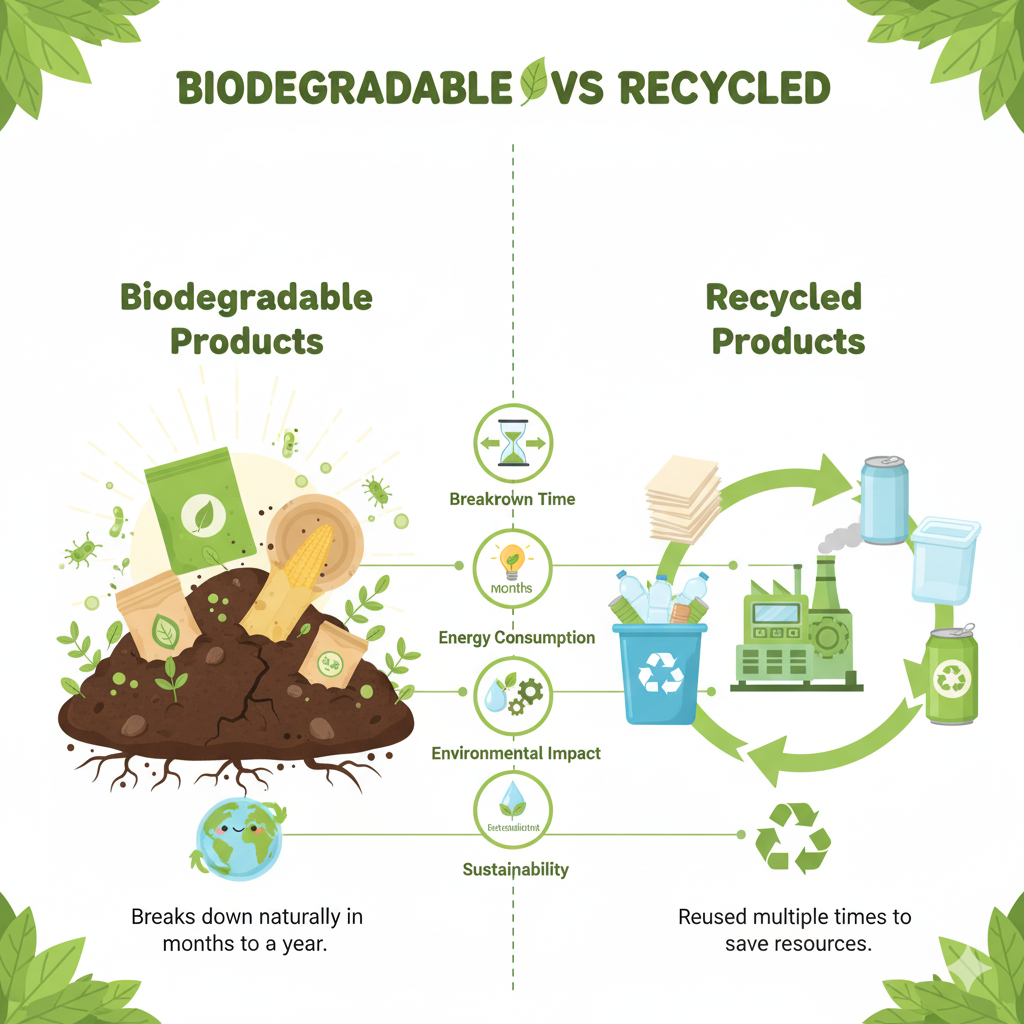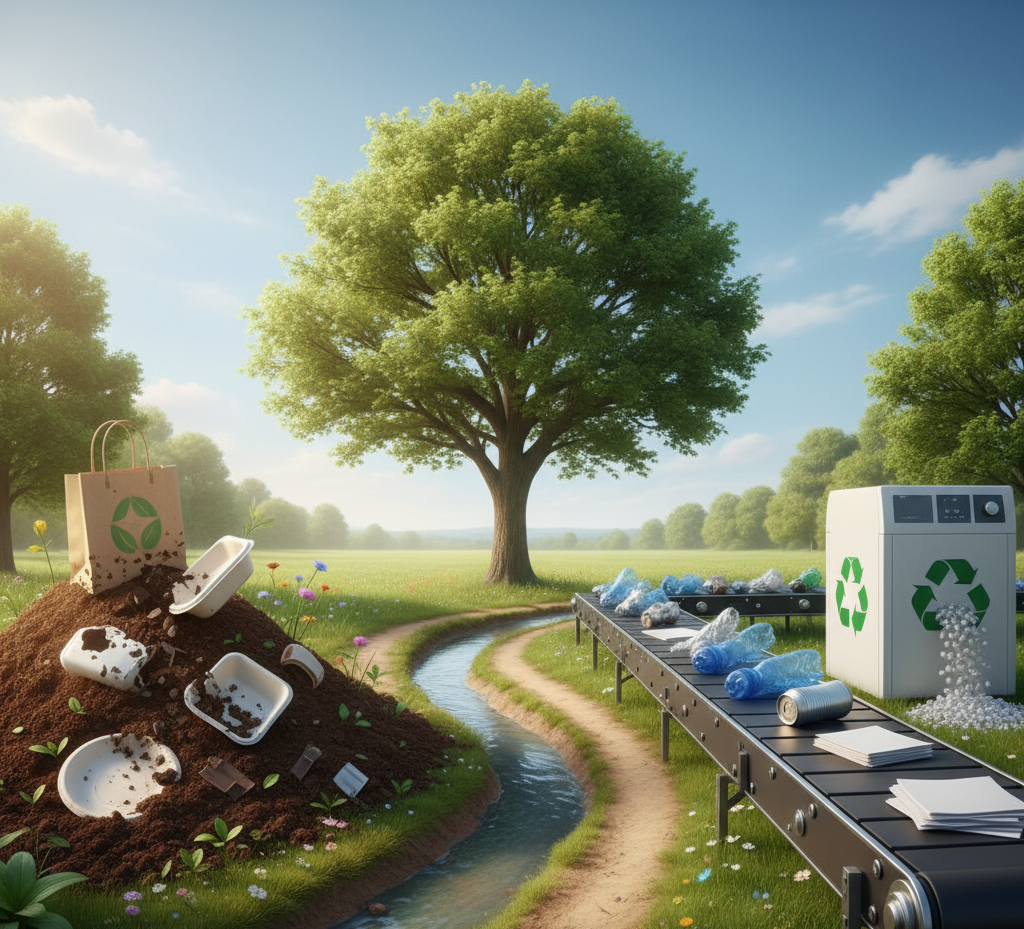We all know that protecting the environment is important, but sometimes it’s hard to know which products are better for the planet. Two popular choices are biodegradable products and recycled products. Both aim to reduce waste and help the Earth, but they work in very different ways. Let’s explore what makes each special and which might be better for our planet.
What Are Biodegradable Products?
Biodegradable products are items that can naturally break down into smaller, harmless parts with the help of bacteria, fungi, and other natural processes. Unlike regular plastic that can stay in the ground for hundreds of years, biodegradable materials disappear in a much shorter time, usually a few months to a year, depending on where they are.
These products are made from natural materials like plants, cornstarch, or sugarcane fibers. That means they don’t leave dangerous chemicals behind when they break down. This is why many people prefer biodegradable products—they help keep the Earth cleaner and safer.
Benefits of Biodegradable Products
- Less Waste in Landfills
Because they decompose quickly, biodegradable products do not pile up in landfills for years. This helps reduce the huge amount of waste that cities have to manage. - Safer for Animals and Oceans
Biodegradable materials break down faster, which reduces the risk of harming animals if these products accidentally end up in rivers, lakes, or oceans. - Lower Carbon Footprint
Making biodegradable products usually uses less energy than making traditional plastics. This helps reduce greenhouse gases that cause climate change.
What Are Recycled Products?
Recycled products are made from materials that have already been used before, like old paper, plastic bottles, or metal cans. Instead of throwing these items away, they are cleaned, processed, and turned into something new.
Recycling saves natural resources, because it reduces the need to make products from raw materials. It also helps create a “circular economy,” where materials are reused multiple times instead of being thrown away after one use.
Benefits of Recycled Products
- Saves Natural Resources
By reusing materials, we don’t have to cut down as many trees or use as much oil to make new plastics. - Energy Savings
Producing items from recycled materials often uses less energy than creating them from scratch. - Reduces Waste
Recycling keeps waste out of landfills and gives materials a longer life, which is good for the planet.
Biodegradable vs. Recycled Products: A Simple Comparison

Here’s an easy way to understand the difference between biodegradable products and recycled products:
| Feature | Biodegradable Products | Recycled Products |
| Breakdown Time | Break down naturally in months to a year | Can last a long time; reused many times |
| End Result | Turns into natural elements like soil | Becomes new products |
| Materials Used | Made from plants and natural resources | Made from used materials |
| Energy Needed | Usually low during production | Can be higher due to processing |
| Environmental Safety | Safe if disposed properly | Safe if recycled correctly |
Which One Should You Choose?
Both biodegradable and recycled products are better than normal plastics, but they have different strengths.
- If you want something that will disappear naturally and not harm the Earth, biodegradable products are a great choice.
- If you want to reuse materials and save natural resources, recycled products are very useful.
Sometimes the best solution is to use both! For example, using biodegradable packaging that is also made from recycled materials can help the environment even more.
Conclusion
Both biodegradable products and recycled products are great choices for helping the planet. Understanding the difference between them can help us make better choices. Using sustainable packaging and eco friendly products reduces waste and pollution, which is better for the Earth.
If you want to make environmentally smart choices, consider exploring GreenMatter Packaging. They offer a wide range of biodegradable products and sustainable packaging solutions that help protect the planet while meeting your everyday needs. By choosing these products, you can play your part in creating a greener, cleaner world.
FAQs About Biodegradable vs Recycled Products
Q1: Are biodegradable products always better than recycled products?
A1: Not always. Biodegradable products are good for breaking down quickly, but they need the right conditions to decompose. Recycling helps save resources, so both are important.
Q2: Can recycled products be used forever?
A2: No, recycled materials can only be reused a few times before they lose quality. But recycling still extends their life and reduces waste.
Q3: Are biodegradable products safe for oceans?
A3: Yes! Biodegradable products break down faster than regular plastics, which makes them safer for marine life.
Q4: Which costs more: biodegradable or recycled products?
A4: It depends on the product and how it is made. Sometimes biodegradable items cost a little more because of the natural materials used, but they are worth it for the environment.


